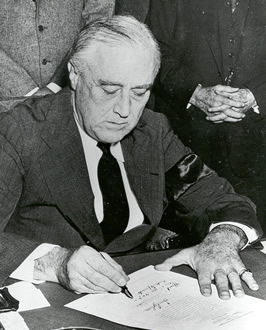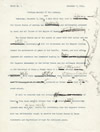|
Address to Congress
Requesting a Declaration of War with Japan
December 8, 1941
Enlargement
Audio
(2.8 MB,
Real Audio
)
Mr. Vice
President, and Mr. Speaker, and Members of the Senate and House of
Representatives:
Yesterday,
December 7, 1941 -- a date which will live in infamy -- the United States
of America was suddenly and deliberately attacked by naval and air forces
of the Empire of Japan.
The United
States was at peace with that Nation and, at the solicitation of Japan, was
still in conversation with its Government and its Emperor looking toward
the maintenance of peace in the Pacific. Indeed, one hour after Japanese
air squadrons had commenced bombing in the American Island of Oahu, the
Japanese Ambassador to the United States and his colleague delivered to our
Secretary of State a formal reply to a recent American message. And while
this reply stated that it seemed useless to continue the existing
diplomatic negotiations, it contained no threat or hint of war or of armed
attack.
It will be
recorded that the distance of Hawaii from Japan makes it obvious that the
attack was deliberately planned many days or even weeks ago. During the
intervening time the Japanese Government has deliberately sought to deceive
the United States by false statements and expressions of hope for continued
peace.
The attack
yesterday on the Hawaiian Islands has caused severe damage to American
naval and military forces. I regret to tell you that very many American
lives have been lost. In addition American ships have been reported
torpedoed on the high seas between San Francisco and Honolulu.
Yesterday the
Japanese Government also launched an attack against Malaya.
Last night Japanese forces attacked Hong Kong.
Last night Japanese forces attacked Guam.
Last night Japanese forces attacked the Philippine Islands.
Last night the Japanese attacked Wake Island. And this morning the
Japanese attacked Midway Island.
Japan has,
therefore, undertaken a surprise offensive extending throughout the Pacific
area. The facts of yesterday and today speak for themselves. The people of
the United States have already formed their opinions and well understand
the implications to the very life and safety of our Nation.
As Commander
in Chief of the Army and Navy I have directed that all measures be taken
for our defense.
But always
will our whole Nation remember the character of the onslaught against us.
No matter how
long it may take us to overcome this premeditated invasion, the American
people in their righteous might will win through to absolute victory. I
believe that I interpret the will of the Congress and of the people when I
assert that we will not only defend ourselves to the uttermost but will
make it very certain that this form of treachery shall never again endanger
us.
Hostilities
exist. There is no blinking at the fact that our people, our territory, and
our interests are in grave danger.
With
confidence in our armed forces- with the unbounding determination of our
people- we will gain the inevitable triumph- so help us God.
I ask that the
Congress declare that since the unprovoked and dastardly attack by Japan on
Sunday, December 7, 1941, a state of war has existed between the United
States and the Japanese Empire.
Audio
(2.8 MB,
Real Audio
)
| 
